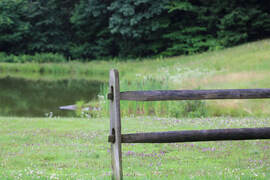 As we travel our Advent journey, it’s difficult for us to imagine how John the Baptist could have missed the truth that Jesus was indeed the messiah—the one who was to come. Consider the evidence: the blind could see, the lame could walk, the lepers were healed, the deaf could hear, the dead were alive, and the poor received good news. And yet John—who was on his own Advent journey—seemed uncertain about which step to take next. Jesus was not following the road map that John had expected. Jesus replaced John’s message of judgment and repentance with one of forgiveness and redemption. But despite his uncertain footing, John did not give up his journey. John’s questioning about Jesus’ identity reveals a desire to travel onward. John’s question reminds us that faith involves taking risks.
0 Comments
 Our Advent journey continues. And as we travel, we hear the words, “Prepare the way of the Lord.” But which of the many roads that lie in front of us is the “way of the Lord”? Which path are we to choose if we are to reach the coming Christ? The ministry of John the Baptist is a good reminder that God rarely calls us to follow the well-beaten paths of the world. John the Baptist offers no indication that the road we are to travel will be easy or predictable. John presented an appearance that was hard on the eyes and preached a message that was even harder on the ears. He was not exactly the ideal advance man for a coming king. And yet it fell to John to prepare the way of the Lord. A call to that same task beckons us as we travel our Advent journey.  Today we begin the journey of Advent. It’s a journey that—if traveled faithfully—will lead us to a place where we truly can welcome the coming Christ. If we take seriously the warning that the Christ will come at an unexpected hour, perhaps the best way we can travel our Advent journey is on tiptoe. Walking on tiptoe. Stretching and straining in anticipation of what wonder might lie ahead. How often do we travel our daily journeys with heads down, eyes riveted straight ahead? If there’s something out of the ordinary waiting along our path, we’d rather not see it. We live in a world that prefers the predictable to the surprising.  Earlier this summer I had the privilege of working with a group of elementary-school-age students for a week. My assignment was to help the students focus on the story of a person of faith from the Bible. That week we began each day by exploring a different aspect of the story of Noah. We talked about whom we might pick to help when the world gets into a big mess. (Trust me, an old guy wasn’t anyone’s first choice.) We talked about what it might mean to take on a big job from God and how it might have felt to wait through a big flood. (Waiting was not on the top of anyone’s list of favorite things.) We wrapped up the week by talking about the big promise Noah received from God and the big lesson we might take from his story. The students delighted me each day with their ability to imagine new ways to understand the story of Noah and to connect that story to their own lives. They shared ways in which the world today is in a big mess; the jobs that God might invite them to do; the trust and patience it takes to wait; and how they can believe in God’s promises. I’ve learned over the years that I always receive more than I give when I work with children. This summer was no different, but the specific gift came as a surprise.  I love hearing stories. Stories about people’s lives. Stories about congregations. Stories about towns or other communities. This morning I got to listen in as older members of a congregation told stories. Most of them began: “Remember when. . . .” One of those members also told me about recent conversations she and her siblings have shared. Those conversations also focused on remembering as a way of processing their experiences during the pandemic and identifying the things that really matter to them. As we all seek ways to move forward following a time of upheaval and uncertainty, perhaps remembering is what we need to do. Remembering can help us identify what’s important to us. It can ground us—reminding of us of where we’ve been and providing perspective on where we want to go. It also can provide us with reasons for gratitude and hope—both of which help us treasure what’s really important in our lives as we move forward. Perhaps even more powerfully, remembering can join us to others. It can link us to others in transformative ways.  My birthday was earlier this month, and I heard from a number of friends from across the country. Each call, text, card, and post reminded me how fortunate I am to have people in my life who see the best in me and believe the best will unfold for me. But how many of us have had the opposite experience? A time in our life when someone assumed the worst about us. Perhaps even reached that assumption without really knowing us. It’s funny how such an assumption can lead to so many dead ends. Having someone assume the worst about us can stop us from exploring new possibilities, from trying new paths, from being our authentic selves. Someone else’s negative assumption can cast a shadow over how we see ourselves, shrink what we believe about our potential, and limit what we’re willing to risk. After divinity school I moved to central Kentucky to serve on my first church staff. It didn’t take long to discover that my new neighbors were less than thrilled to have a “preacher” living next door. Despite their politeness, the message was pretty clear: We’re not interested in getting to know you. I found myself feeling self-conscious when we would run into each other. In fact, sometimes if I saw one of my neighbors getting into his or her car in front of our houses, I would wait a few minutes before heading out to my car to avoid the awkwardness. Fortunately, things changed over the months that followed. My neighbors and I got to know each other and became great friends. At some point one of those neighbors told me she’d had all kinds of negative assumptions about me. Because of bad experiences she’s had with the church, she assumed that she knew what I believed, how I viewed the world, and how I would treat her. Even to this day, she admits that she can be surprised by how I view a given issue or make sense of a certain situation.  Several years ago as I was standing in line for a rental car, I heard the agent tell the person in front of me, “You’ll be able to find every kind of restaurant here that you can imagine.” The rental car desk was in the airport in Tulsa, Oklahoma. There are many things to appreciate about my hometown, but I can’t agree with the rental-car agent. Unless you’re looking for really good chicken-fried steak, BBQ, or Tex-Mex, there are limits in Tulsa’s restaurant options. That experience reminds me how often a lack of imagination can limit us. I’m also reminded of that each time I hear someone say, “I could never imagine. . . .” So what limits our imaginations? I think expectations may be one of those things. Expectations can be positive. They can spur us to strive for excellence or inspire us to continue to grow and discover who we are. But expectations also can have negative effects. They can diminish our sense of self-worth or belonging. They can make us feel less worthy, less capable, less adequate because who we are or what we do seems to fall short of what’s expected.  Imagine. That word was front and center during American Baptists' recent virtual Biennial Mission Summit. It was not only the theme for this online gathering, but in many ways it defined the event. Two years ago when American Baptists gathered in Virginia Beach, who could have imagined that the next Biennial would take place virtually rather than in Puerto Rico as was planned? Who could have imagined the challenges and changes that would be sparked by a global pandemic? The anxiety and loss? The weariness and uncertainty? But the opportunities for worship, learning, sharing, and reconnecting offered as part of the virtual Biennial remind us about another aspect of imagination. Two years ago few if any in our denomination would have imagined being able to make the current Biennial a reality. But rather than allowing COVID’s countless challenges to become roadblocks, American Baptists have used them as springboards from which imagination has soared. We have imagined new ways to worship and learn together in meaningful ways; to care for one another and reach out to others; and to create opportunities for authentic community.  Several weeks ago a participant in one of our Elder Care Ministries Zoom coffee chats shared about a course in which she and others are learning to use round words instead of cactus words. The image of cactus words has stuck with me. It brings to mind those sharp or prickly words. The ones that are barb-like and pierce so easily. The ones that often roll off our tongues or our keyboards just as easily. While I also appreciate the image of round words, I find it more difficult to explain what I think it means. When someone asked me to name some round words, I was unsure how to answer in that moment. But I’ve continued thinking about how to describe round words. Here are some things I think they’re not. They’re not words that simply allow us to go around difficult topics—words that are so soft or squishy that they convey nothing concrete or meaningful. They’re also not words that cause us to go round and round in circles—words that are not defined well enough that we can share a common understanding when we use them. Instead, it seems to me that round words have substance without having sharp edges. They invite conversation rather than inflict wounds. They communicate meaning not malice, hope not harshness, sincerity not sarcasm, and openness not obstruction.  Several years ago the editor of the local newspaper emailed me, along with a number of other folks, to ask about my New Year’s resolution. I thought about responding with a carton that hangs on the bulletin board in my office. The cartoon is from the comic strip Non Sequitur and features Danae, a precocious girl with a pessimistic view of the world, but not of herself. Several frames of the carton show Danae sitting at a desk, working on her New Year’s resolutions. In the fourth frame, she’s whistling as she walks away from the desk, leaving behind a list that has a single entry: “Don’t mess with perfection.” When the local newspaper arrived and I noticed my resolution highlighted on the front page, I was relieved I hadn’t gone with my initial impulse. I still love the cartoon, but I’m glad I went in a more serious direction. Here’s what I actually wrote in response to the editor’s inquiry: “I resolve to live more in the present. I hope this will help me notice and appreciate the things of beauty, wonder, and joy that offer themselves each day.” As nice as that resolution may sound, the question still remained as to how I would begin to keep it. |
Kathryn PalenAssociate Executive Minister Archives
January 2023
Categories |
 RSS Feed
RSS Feed